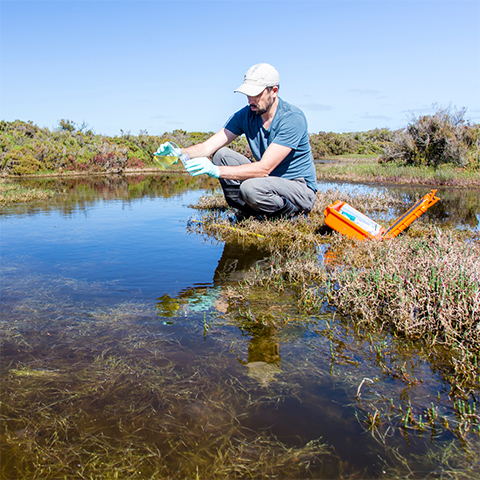
This project was funded by the Australian Government ($2.45 million). Australian Government funding was provided through the National Water Grid Fund.

The investigation tested whether a site in the Upper King River could be suitable for MAR.
Project overview
Managed aquifer recharge (MAR) is the intentional recharge of water into groundwater aquifers for later use. Subsequent recovery can be for environmental benefit. It can also improve water security. It provides a drought reserve, as water stored underground won’t evaporate like water stored in surface dams.
An investigation has been undertaken to test whether a site in the Katherine region of the Northern Territory could be suitable for MAR. This site is located along the Upper King River. In 2019-20, this region suffered 3 consecutive below average wet seasons and the underlying Katherine Tindall Limestone Aquifer did not recharge. This led to reduced water allocations for many licence holders in the region.
A MAR scheme could provide greater water security in this region by helping to ensure water is available even after poor recharge seasons.
This initial investigation is part of a staged program based on an established Australian framework for developing MAR schemes.
Goals of the assessment
The project aimed to test whether the selected site is suitable for MAR. It considered whether a MAR scheme could provide ongoing water security to agricultural groundwater licence holders. These holders are in the eastern areas of the Katherine Tindall Limestone Aquifer.
Outcomes of the assessment
Outcomes included:
- establishing constructive relationships with key stakeholders (leaseholders, Traditional Owners and industry groups)
- developing baseline water quality datasets for the Upper King River and underlying Tindall Limestone Aquifer. This helped to determine suitability and potential water treatment requirements for a MAR scheme
- the hydrogeological suitability of the study site was generally low risk and technically feasible for the development of a MAR scheme
- assessing the surface water flow characteristics of the Upper King River to determining water availability and timing of potential offtake and injection
- assessing the existing legislative, regulatory and policy limitations for developing a MAR scheme at the site
- completing the initial stages of CSIRO’s MAR risk assessment framework and making recommendations for a future pilot program as the next stage
- highlighting uncertainties that require resolution before progressing to a pilot trial.
The project also addressed knowledge gaps regarding:
- surface water available to be injected into the aquifer
- performance of injection bores used to add water to the aquifer
- understanding of the aquifer’s geology and how water will move through the system
- water quality of the source water and the water in the aquifer, to understand how compatible they are
- possible policy constraints for MAR in the selected location.
The Northern Territory Government can use project outcomes to consider updates to relevant legislation and their water plan.
Key project benefits
Learn more
- Read about the Upper King River Managed Aquifer Recharge Project – Drilling Investigation Report (Groves, 2024)
- Read about the Territory water plan
- Learn more about our Science Program
- Project page: Rapid appraisal of Managed Aquifer Recharge opportunities for agriculture

